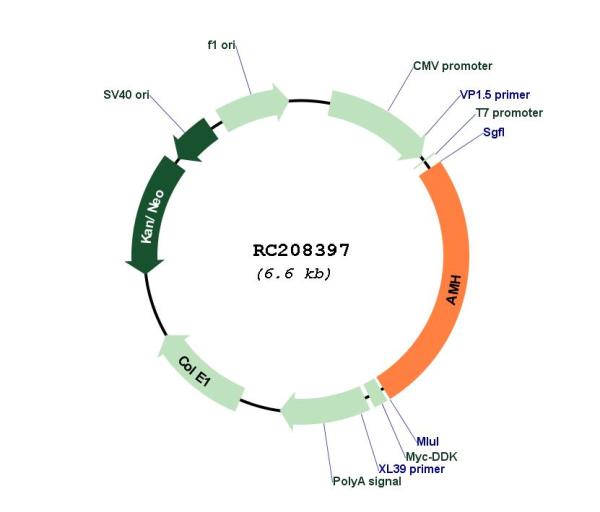AMH (NM_000479) Human Tagged ORF Clone
CAT#: RC208397
AMH (Myc-DDK-tagged)-Human anti-Mullerian hormone (AMH)
ORF Plasmid: tGFP
Lentiviral Particles: DDK DDK w/ Puro mGFP mGFP w/ Puro
"NM_000479" in other vectors (6)
USD 198.00
Specifications
| Product Data | |
| Type | Human Tagged ORF Clone |
| Tag | Myc-DDK |
| Symbol | AMH |
| Synonyms | MIF; MIS |
| Vector | pCMV6-Entry |
| E. coli Selection | Kanamycin (25 ug/mL) |
| Mammalian Cell Selection | Neomycin |
| Sequence Data |
>RC208397 representing NM_000479
Red=Cloning site Blue=ORF Green=Tags(s) TTTTGTAATACGACTCACTATAGGGCGGCCGGGAATTCGTCGACTGGATCCGGTACCGAGGAGATCTGCC GCCGCGATCGCC ATGCGGGACCTGCCTCTCACCAGCCTGGCCCTAGTGCTGTCTGCCCTGGGGGCTCTGCTGGGGACTGAGG CCCTCAGAGCAGAGGAGCCAGCTGTGGGCACCAGTGGCCTCATCTTCCGAGAAGACTTGGACTGGCCTCC AGGCAGCCCACAAGAGCCTCTGTGCCTGGTGGCACTGGGCGGGGACAGCAATGGCAGCAGCTCCCCCCTG CGGGTGGTGGGGGCTCTAAGCGCCTATGAGCAGGCCTTCCTGGGGGCCGTGCAGAGGGCCCGCTGGGGCC CCCGAGACCTGGCCACCTTCGGGGTCTGCAACACCGGTGACAGGCAGGCTGCCTTGCCCTCTCTACGGCG GCTGGGGGCCTGGCTGCGGGACCCTGGGGGGCAGCGCCTGGTGGTCCTACACCTGGAGGAAGTGACCTGG GAGCCAACACCCTCGCTGAGGTTCCAGGAGCCCCCGCCTGGAGGAGCTGGCCCCCCAGAGCTGGCGCTGC TGGTGCTGTACCCTGGGCCTGGCCCTGAGGTCACTGTGACGAGGGCTGGGCTGCCAGGTGCCCAGAGCCT CTGCCCCTCCCGAGACACCCGCTACCTGGTGTTAGCGGTGGACCGCCCTGCGGGGGCCTGGCGCGGCTCC GGGCTGGCCTTGACCCTGCAGCCCCGCGGAGAGGACTCCCGGCTGAGTACCGCCCGGCTGCAGGCACTGC TGTTCGGCGACGACCACCGCTGCTTCACACGGATGACCCCGGCCCTGCTCCTGCTGCCGCGGTCCGAGCC CGCGCCGCTGCCTGCGCACGGCCAGCTGGACACCGTGCCCTTCCCGCCGCCCAGGCCATCCGCGGAACTC GAGGAGTCGCCACCCAGCGCAGACCCCTTCCTGGAGACGCTCACGCGCCTGGTGCGGGCGCTGCGGGTCC CCCCGGCCCGGGCCTCCGCGCCGCGCCTGGCCCTGGATCCGGACGCGCTGGCCGGCTTCCCGCAGGGCCT AGTCAACCTGTCGGACCCCGCGGCGCTGGAGCGCCTACTCGACGGCGAGGAGCCGCTGCTGCTGCTGCTG AGGCCCACTGCGGCCACCACCGGGGATCCTGCGCCCCTGCACGACCCCACGTCGGCGCCGTGGGCCACGG CCCTGGCGCGCCGCGTGGCTGCTGAACTGCAAGCGGCGGCTGCCGAGCTGCGAAGCCTCCCGGGTCTGCC TCCGGCCACAGCCCCGCTGCTGGCGCGCCTGCTCGCGCTCTGCCCAGGAGGCCCCGGCGGCCTCGGCGAT CCCCTGCGAGCGCTGCTGCTCCTGAAGGCGCTGCAGGGCCTGCGCGTGGAGTGGCGCGGGCGGGATCCGC GCGGGCCGGGTCGGGCACAGCGCAGCGCGGGGGCCACCGCCGCCGACGGGCCGTGCGCGCTGCGCGAGCT CAGCGTAGACCTCCGCGCCGAGCGCTCCGTACTCATCCCCGAGACCTACCAGGCCAACAATTGCCAGGGC GTGTGCGGCTGGCCTCAGTCCGACCGCAACCCGCGCTACGGCAACCACGTGGTGCTGCTGCTGAAGATGC AGGCCCGTGGGGCCGCCCTGGCGCGCCCACCCTGCTGCGTGCCCACCGCCTACGCGGGCAAGCTGCTCAT CAGCCTGTCGGAGGAGCGCATCAGCGCGCACCACGTGCCCAACATGGTGGCCACCGAGTGTGGCTGCCGG ACGCGTACGCGGCCGCTCGAGCAGAAACTCATCTCAGAAGAGGATCTGGCAGCAAATGATATCCTGGATT ACAAGGATGACGACGATAAGGTTTAA >RC208397 representing NM_000479
Red=Cloning site Green=Tags(s) MRDLPLTSLALVLSALGALLGTEALRAEEPAVGTSGLIFREDLDWPPGSPQEPLCLVALGGDSNGSSSPL RVVGALSAYEQAFLGAVQRARWGPRDLATFGVCNTGDRQAALPSLRRLGAWLRDPGGQRLVVLHLEEVTW EPTPSLRFQEPPPGGAGPPELALLVLYPGPGPEVTVTRAGLPGAQSLCPSRDTRYLVLAVDRPAGAWRGS GLALTLQPRGEDSRLSTARLQALLFGDDHRCFTRMTPALLLLPRSEPAPLPAHGQLDTVPFPPPRPSAEL EESPPSADPFLETLTRLVRALRVPPARASAPRLALDPDALAGFPQGLVNLSDPAALERLLDGEEPLLLLL RPTAATTGDPAPLHDPTSAPWATALARRVAAELQAAAAELRSLPGLPPATAPLLARLLALCPGGPGGLGD PLRALLLLKALQGLRVEWRGRDPRGPGRAQRSAGATAADGPCALRELSVDLRAERSVLIPETYQANNCQG VCGWPQSDRNPRYGNHVVLLLKMQARGAALARPPCCVPTAYAGKLLISLSEERISAHHVPNMVATECGCR TRTRPLEQKLISEEDLAANDILDYKDDDDKV |
| Chromatograms |
CHROMATOGRAMS
 Sequencher program is needed, download here. |
| Restriction Sites |
SgfI-MluI
Cloning Scheme for this gene
Plasmid Map

|
| ACCN | NM_000479 |
| ORF Size | 1680 bp |
| OTI Disclaimer | Due to the inherent nature of this plasmid, standard methods to replicate additional amounts of DNA in E. coli are highly likely to result in mutations and/or rearrangements. Therefore, OriGene does not guarantee the capability to replicate this plasmid DNA. Additional amounts of DNA can be purchased from OriGene with batch-specific, full-sequence verification at a reduced cost. Please contact our customer care team at custsupport@origene.com or by calling 301.340.3188 option 3 for pricing and delivery. The molecular sequence of this clone aligns with the gene accession number as a point of reference only. However, individual transcript sequences of the same gene can differ through naturally occurring variations (e.g. polymorphisms), each with its own valid existence. This clone is substantially in agreement with the reference, but a complete review of all prevailing variants is recommended prior to use. More info |
| OTI Annotation | This clone was engineered to express the complete ORF with an expression tag. Expression varies depending on the nature of the gene. |
| Product Components | The ORF clone is ion-exchange column purified and shipped in a 2D barcoded Matrix tube containing 10ug of transfection-ready, dried plasmid DNA (reconstitute with 100 ul of water). |
| Reconstitution | 1. Centrifuge at 5,000xg for 5min. 2. Carefully open the tube and add 100ul of sterile water to dissolve the DNA. 3. Close the tube and incubate for 10 minutes at room temperature. 4. Briefly vortex the tube and then do a quick spin (less than 5000xg) to concentrate the liquid at the bottom. 5. Store the suspended plasmid at -20°C. The DNA is stable for at least one year from date of shipping when stored at -20°C. |
| Reference Data | |
| RefSeq | NM_000479.5 |
| RefSeq Size | 2008 bp |
| RefSeq ORF | 1683 bp |
| Locus ID | 268 |
| UniProt ID | P03971 |
| Cytogenetics | 19p13.3 |
| Protein Families | Druggable Genome, Secreted Protein |
| Protein Pathways | Cytokine-cytokine receptor interaction, TGF-beta signaling pathway |
| MW | 59.17 kDa |
| Gene Summary | This gene encodes a secreted ligand of the TGF-beta (transforming growth factor-beta) superfamily of proteins. Ligands of this family bind various TGF-beta receptors leading to recruitment and activation of SMAD family transcription factors that regulate gene expression. The encoded preproprotein is proteolytically processed to generate N- and C-terminal cleavage products that homodimerize and associate to form a biologically active noncovalent complex. This complex binds to the anti-Mullerian hormone receptor type 2 and causes the regression of Mullerian ducts in the male embryo that would otherwise differentiate into the uterus and fallopian tubes. This protein also plays a role in Leydig cell differentiation and function and follicular development in adult females. Mutations in this gene result in persistent Mullerian duct syndrome. [provided by RefSeq, Jul 2016] |
Documents
| Product Manuals |
| FAQs |
| SDS |
Resources
Other Versions
| SKU | Description | Size | Price |
|---|---|---|---|
| RC208397L1 | Lenti ORF clone of Human anti-Mullerian hormone (AMH), Myc-DDK-tagged |
USD 1,082.00 |
|
| RC208397L2 | Lenti ORF clone of Human anti-Mullerian hormone (AMH), mGFP tagged |
USD 1,082.00 |
|
| RC208397L3 | Lenti ORF clone of Human anti-Mullerian hormone (AMH), Myc-DDK-tagged |
USD 1,082.00 |
|
| RC208397L4 | Lenti ORF clone of Human anti-Mullerian hormone (AMH), mGFP tagged |
USD 1,082.00 |
|
| RG208397 | AMH (tGFP-tagged) - Human anti-Mullerian hormone (AMH) |
USD 982.00 |
|
| SC126077 | AMH (untagged)-Human anti-Mullerian hormone (AMH) |
USD 783.00 |
{0} Product Review(s)
Be the first one to submit a review






























































































































































































































































 Germany
Germany
 Japan
Japan
 United Kingdom
United Kingdom
 China
China





